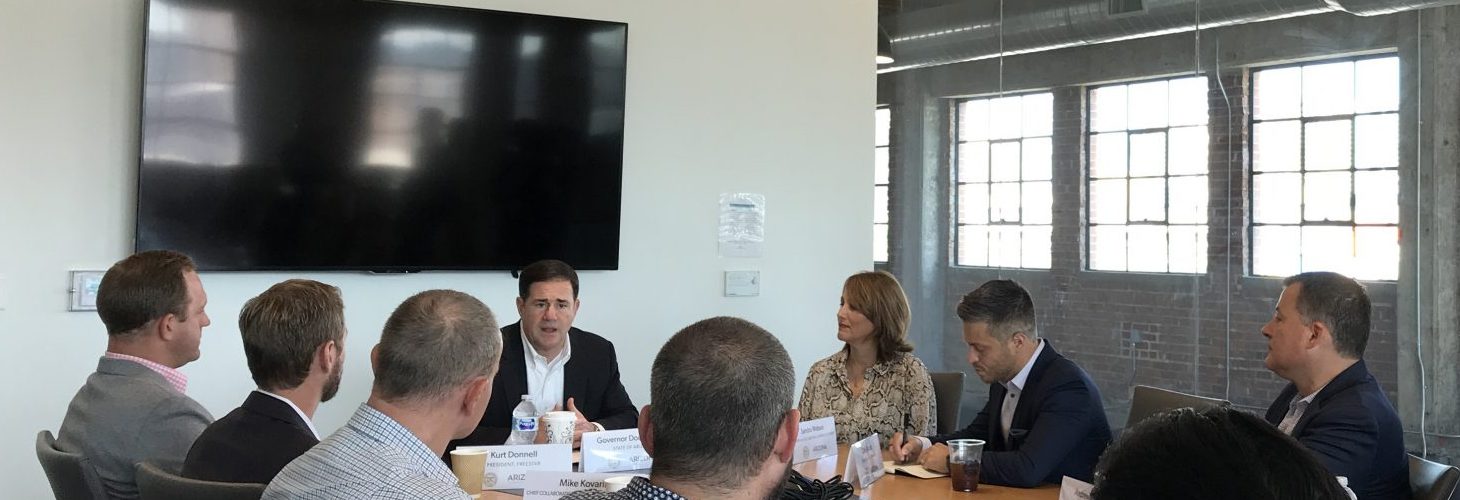This week, Gov. Doug Ducey and the Arizona Commerce Authority partnered to host a roundtable with more than a dozen local entrepreneurs to discuss the successes and challenges of being a startup leader in the state.
The roundtable, hosted at Galvanize in Downtown Phoenix, featured entrepreneurs who participated in ACA’s Arizona Innovation Challenge – a technology commercialization competition that has awarded 90 leading tech companies since 2011.
Participating in the roundtable were local tech firms such as Freestar, Beacon Biomedical, BrightGuest, CI Tracker, Admiral Instruments, and Digitile, among others.
Gov. Ducey kicked off the event by welcoming the entrepreneurs and thanking them for their efforts as state business leaders and innovators.
“We’re not really in political election season yet, but we’re close, and one of the things I get the biggest kick about is all these politicians and people running for office talking about the jobs that they’re going to create,” Gov. Ducey said. “Politicians don’t create any jobs; it’s people around this table and your employees and the entrepreneurs in this country that create jobs – the people that take on the risk. But a governor can create the environment in which jobs can be created, and that’s been my objective.”
The governor emphasized the glowing health of the Arizona economy, citing its billion dollar surplus, investment in K-12 education, widespread job creation, and the rapid growth rate of Maricopa County.
After participating members introduced themselves, the roundtable broke out into a discussion about economic development in Arizona compared to other tech hubs, such as Silicon Valley.
“We go to Silicon Valley for economic development; we talk to the leaders up there. Many are household names; they are not necessarily going to relocate from Silicon Valley, but they are not going to scale up businesses there any longer,” Gov. Ducey said. “And I think five years ago, they were looking at Nevada, Utah, Colorado, and Arizona; today, I would say we’re their first stop.”
Shon Burton, founder and CEO of recruiting software firm HiringSolved, explained that the programming talent from Arizona State University and the University of Arizona is among the best in the nation. And because of the affordable cost and high standard of living, that talent tends to stay in the area instead of migrating towards more expensive locations, such as northern California.
During the discussion, many entrepreneurs highlighted health care as one of their main challenges as small-to-mid-sized business owners. For example, James Bates, CEO of AdviNOW Medical, noted that his firm cannot easily locate its automated medical clinics in grocery stores because of the limitations of Medicare and Medicaid. “We still run into a lot of roadblocks when it comes down to creating a system that is good for the state and federal government, as well,” he says.
Gov. Ducey responded, addressing the state of national health care policy, “We can influence, and we like to raise our flag and raise our hand to be a test state. I think there’s a desire in public discourse that we need some one-size, top-down, centralized system. To me, that’s not going to work. The only way out of many of these problems is to innovate and to allow different states to compete while protecting consumer and public health.”
Health care poses challenges for potential entrepreneurs, as well, according to Persosa CEO and Founder Gregory Lim. He pointed out that a handful of his peers chose not to pursue an entrepreneurship venture because the costs of health care were so prohibitive.
To this, Breezing CEO Andrew Steele responded with a proposal for a “health tech sandbox.” The state already hosts financial tech and property tech sandboxes, he explained; a sandbox focused on health care could be the next best step for Arizona and its flexible regulatory policy.
Mike Kovarik, CEO of Platform as a Service firm Attribytes, asked about where Arizona is leading and where the governor sees opportunities for growth. Governor Ducey highlighted the elimination of regulatory hurdles as one of the main strengths of Arizona. The elimination of 1,098 regulations was the equivalent of a $73 million tax cut, he noted.
“I have three asks of this group: one is, we do want your ideas. I think that a health tech sandbox is something I want to do. The idea of what is the better tax policy and regulatory policy; those are things we can apply. So, keep your ideas coming, I’m going to listen,” Ducey said. “Two, I want you to have lower costs and higher quality for your customers. So, ask your supply chain, your distributors, your vendors to move to Arizona. Lastly, my only ask is that you have incredible success. The more success you have, the more growth you have, the more people that you’re going to have to hire, the more employees that you’re going to have that are paying taxes and participating like you are – that takes care of all the other problems I have in public policy.”
















Add comment